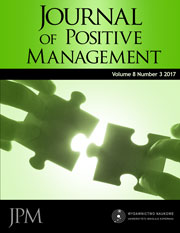Cooperation of higher education institutions with environment. Selected issues on measurement of HEIs' third stream activities
DOI:
https://doi.org/10.12775/JPM.2017.121Keywords
higher education institutions (HEIs), third mission, cooperation of HEIs with environment, indexAbstract
Purpose: This article discusses cooperation of Polish higher education institutions (HEIs) with their environment and offers a way of measuring these activities. The concept and scope of the third stream are discussed and selected model and indicators of measuring HEIs’ activities in this field are presented. The Author suggests Indicator of Cooperation with Environment (ICE) in order to measure levels of HEIs’ interaction with the world around them.
Methodology: The article draws on relevant literature both from Poland and abroad. In order to verify the proposed ICE indicator empirically, a survey was carried out among 100 heads of Polish HEIs. The results of the survey were analysed by using tools of descriptive statistics, and presented according to HEI types.
Findings: The results show correlation between the ICE level and HEI type. The highest level of ICE is observed in public academic HEIs, which makes them stand out as a group as against the other types of HEIs. A signifi cantly lower level of ICE is identified in the case of state vocational HEIs and private HEIs, which makes them a homogeneous group in terms of ICE.
Originality: As can be seen in the literature, the issue of how to measure HEIs’ third stream is rarely raised at a conceptual level and, consequently, in empirical research. The ICE indicator proposed in this article is based on simple indicators which are easy to operationalise and which reflect activities involving teaching, research, academic entrepreneurship as well as HEI management. Validation has confirmed that ICE is effective in achieving the intended measurement goals.
References
Babbie, E. (2004), Badania społeczne w praktyce, PWN, Warszawa.
Błażejowski, J. (2013), „Misja i posłannictwo polskich szkół wyższych na progu XXI wieku”, in: Woźnicki, J. (Ed.), Misja i służebność uniwersytetu w XXI wieku, Wydawnictwo Instytutu Wiedzy i Fundacji Rektorów Polskich, Warszawa, pp. 21 – 24.
Buczek, J., Modrzyński, P. (2015), The third mission of Polish universities: Theory and practice, 2015 PRADEC Conference Proceedings, Vol. 3, No. 1, pp. 86 – 97.
Dyrtkowski, K., Popek, M. (2013), „Uwagi o przedsiębiorczości uczelni w modelu uniwersytetu III generacji”, in: Burawski, D. (Ed.), Uniwersytet Trzeciej Generacji. Stan i perspektywy rozwoju, Poznań, pp. 181 – 190.
George, G., Jain, S., Maltarich, M.A. (2005), Academics or Entrepreneurs? Entrepreneurial Identity and Invention Disclosure Behavior of University Scientists, available at: http://dx.doi.org/10.2139/ssrn.799277 (accessed 27 April 2017).
European Union, Council conclusions on the modernisation of higher education, Official Journal of European Union, 2011/C 372/09.
Kożuch, B., Przygodzka, R. (2011), „Zmiany zachowań organizacyjnych pod wpływem oczekiwań interesariuszy uczelni akademickich”, in: Wawak, T. (Ed.), Wyzwania zarządzania jakością w szkołach wyższych, Wydawnictwo Uniwersytetu Jagiellońskiego, Kraków, pp. 49 – 63.
Kwiek, M. (2015), Uniwersytet w dobie przemian, Wydawnictwo Naukowe PWN, Warszawa.
Kwiek, M. (2012), „The Growing Complexity of the Academic Enterprise in Europe: A Panoramic View”, in:
Kwiek M., Kurkiewicz A. (Eds.), The Modernisation of European Universities. Cross-National Academic Perspectives, Peter Lang, Frankfurt am Main, pp. 27 – 60.
Leja, K. (2013), Zarządzanie uczelnią. Koncepcje i współczesne wyzwania, WoltersKluwer, Warszawa.
Molas-Gallart, J., Salter, A., Patel, P., Scott, A., Duran, X. (2002), Measuring Third Stream Activities. Final Report to the Russell Group of Universities, SPRU, University of Sussex.
Piotrowska-Piątek, A., (2015), „Aktywność szkół wyższych na rzecz społeczności lokalnych – dyskusja wokół pojęcia trzeciej misji”, Optimum. Studia Ekonomiczne, 6, pp. 99 – 109.
Sutz, J. (1997), „The New Role of the University in The Productive Sector” in: Etzkowitz, H., Leydesdorff, L. (Eds.), Universities and the Global Knowledge Economy. A Triple Helix of University – Industry-Government Relations, Pinter, London and Washington, pp. 11 – 20.
Zomer, A., Benneworth, P. (2011), „The Rise of the University`s Third Mission”, in: Enders, J., de Boer, H., Westerheijden, D. (Eds.), Reform of Higher Education in Europe, Sense Publishers, Rotterdam – Boston-Taipei, pp. 81 – 102.
Downloads
Published
How to Cite
Issue
Section
License
Copyright
Articles submitted to the journal should not have been published before in their current or substantially similar form, or be under consideration for publication with another journal. Authors submitting articles for publication warrant that the work is not an infringement of any existing copyright and will indemnify the publisher against any breach of such warranty. For ease of dissemination and to ensure proper policing of use, papers and contributions become the legal copyright of the publisher unless otherwise agreed.
Plagiarism and ghostwriting
In response to the issue of plagiarism and ghostwriting the editors of the Journal of Positive Management has introduced the following rules to counteract these phenomena:
1. Contributors should be aware of their responsibility for a content of manuscripts.
2. Collective authors are obliged to reveal the contribution and an affiliation of each author (i.e. who is an author of specified part of a paper).
3. Any act of dishonesty will be denounced, the editors will inform appropriate institutions about the situation and give evidence of all cases of misconduct and unethical behaviour.
4. The editors may ask contributors for financial disclosure (i.e. contribution of specified institutions).
Stats
Number of views and downloads: 375
Number of citations: 0



